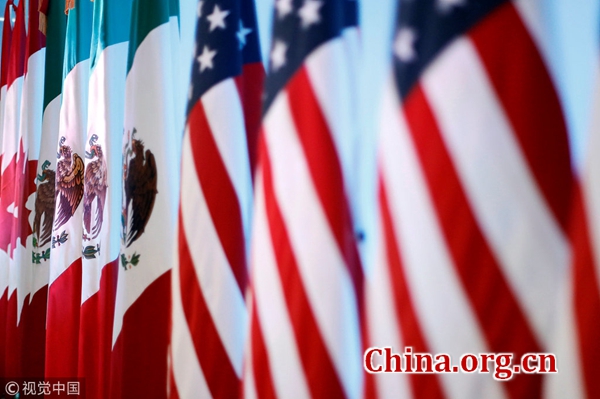Non-market economy in the USMCA Agreement
- By He Shuquan
 0 Comment(s)
0 Comment(s) Print
Print E-mail China.org.cn, October 26, 2018
E-mail China.org.cn, October 26, 2018

When NAFTA members concluded the NAFTA 2.0 deal, which is now named the United States-Mexico-Canada Agreement (USMCA), among the most unexpected and striking clauses was the "non-market" clause. This was especially the case with Article 32.10, which was demanded by the United States. In reality, there are two clauses regarding the non-market economy: One is Article 32.10, the other is Article 1 of Annex 14-D.
What is in Article 1 of Annex 14-D?
This article defines the terms of the investment disputes between Mexico and the United States. It states, "Claimant means an investor of an Annex Party, excluding an investor that is owned or controlled by a person of a non-Annex Party that the other Annex Party considers to be a non-market economy, that is a party to a qualifying investment dispute." This means that an investor controlled or owned by persons from a market non-Annex Party is qualified as the claimant of the disputes, but it is not the case if it is controlled or owned by persons of a non-market non-Annex Party.
What is in Article 32.10?
This article severely limits the ability of USMCA members to enter into a free trade agreement with a non-market economy. The non-market economy is defined as "a country that on the date of signature of this agreement at least one Party has determined to be a non-market economy for purposes of its trade remedy laws and is a country with which no Party has a free trade agreement."
By this article, to commence the negotiation of a free trade agreement (FTA) with a non-market economy, the member has to notify the other members at least 3 months before the negotiation, and provide requested information. In addition, no later than 30 days before the signing of the new agreement, the contracting Party shall provide the other Parties with its full text of the agreement and annexes for review. What is more, such an FTA with a non-market economy allows the other two Parties to terminate or update the USMCA.
What does it mean for the China-Canada economic relations?
Obviously, these articles were added and demanded by the United States and directed exclusively at China, which has already been labeled a non-market economy by the U.S. Department of Commerce in October 2017 and has no FTA with any of the USMCA members. Though it's not unusual for trade agreements to limit the sovereignty of the signatory nations slightly, Article 32.10 seems to take the step too far.
Canada has shown great interest in free trade talks with China in recent years. However, Article 32.10 would make it much more challenging for Canada to do so.
Is there a way out of this for China and Canada? The solution would be to negotiate a sectoral trade agreement rather than draw up a comprehensive free trade agreement between both parties. In reality, Canada and China complement each other in many sectors. For instance, China is interested in safely-sourced food and protein from natural resources from a wider variety of trading partners and this has been something Canada has always excelled in. FTA as defined by WTO is one that must cover substantially all trade and should also help trade flow more freely among the countries in the FTA without raising trade barriers with the outside world. Therefore, a free trade agreement in agriculture or clean energy would not be in opposition to Article 32.10.
Moreover, while an agreement to cut tariffs between China and Canada would be blocked by the other parties, talks on non-tariff issues such as burdensome regulations, which are increasingly more of an issue to business people than the tariff itself, would escape Article 32.10.
It will almost certainly not be the last trade agreement the U.S. requires such a clause to apply to its partners. As the U.S. starts trade talks with the EU and Japan, China has to find ways to deal with and avoid the clause with its trading partners.
He Shuquan is a professor with the School of Economics of Shanghai University.
Opinion articles reflect the views of their authors, not necessarily those of China.org.cn.






Go to Forum >>0 Comment(s)